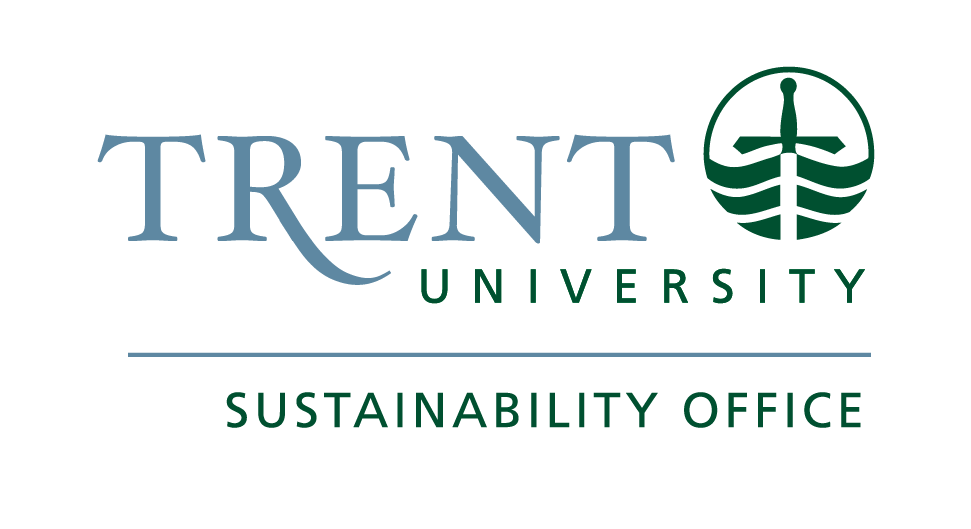At Trent, we are committed to taking a leadership role in advancing sustainability. We integrate sustainable practices into our operations and collaborate with a dynamic network of organizations to elevate our impact. We recognize the need to adopt sustainable practice to address climate change and reduce pollution.
Our approach is driven by forward-thinking policies and practical guidelines that ensure responsible practices, regulatory compliance, and continuous improvement. These efforts support environmental health, foster a circular economy, promote social justice, and encourage sustainable procurement across campus.
Environmental Stewardship
Environment and Sustainability Policy: Trent University is committed to protecting the environment, conserving resources, and integrating sustainable practices across all areas of campus life. Through a collaborative approach, we work to reduce environmental impact, promote resource stewardship, and engage the university community in sustainability initiatives.
Sustainable Procurement and Fair Trade
Fair Trade Purchasing Policy for Apparel at Trent University: This policy guides all apparel purchased by the institution is produced under humane, lawful, and ethical working conditions. This policy applies to all departments, student associations, and vendors on campus. Apparel suppliers must comply with international standards set by the International Labour Organization (ILO) and the UN, promoting fair labor practices, safe working environments, and respect for human rights in the apparel industry.
Policy on Environmentally Sustainable Procurement: This policy commits Trent University to reducing its environmental impact through sustainable purchasing practices. It applies to all staff and faculty making purchases on behalf of the university and emphasizes the selection of local, organic, and Fair Trade products. Prioritizing reusable and compostable items, the policy encourages minimizing energy and water use and address plastic waste while considering the environmental impact of goods and services. By integrating sustainability into procurement, this policy aims to enhance stewardship and reduce the university’s carbon footprint. (original policy: Environmental Procurement Policy, 1995)
Waste Reduction and Resource Recovery
Policy on Resource Recovery & Waste Diversion: This policy aims to minimize Trent University's environmental impact through sustainable waste management, focusing on reduction, reuse, composting, and recycling instead of landfill disposal. It applies to all university buildings and external spaces, implementing standardized multi-bin resource recovery stations for efficient waste sorting. Key initiatives include banning polystyrene, reducing single-use plastics, eliminating black garbage bags, and ensuring specialty recycling for batteries and electronics. The university is dedicated to optimizing waste diversion in all operations, including construction projects, while promoting programs to decrease paper use and food waste on campus.
Policy on Single Unit Bottled Water at Trent University: This policy aims to reduce environmental and social harm from commercial bottled water by promoting the consumption of municipal tap water on campus. It applies to all Trent University-managed outlets, including cafeterias, vending machines, and sanctioned events, as well as departments and affiliated groups. The sale and purchase of bottled water on university property are not permitted, with exceptions for emergencies or health and safety issues. All new facilities must include at least one water fountain to support this initiative.
Laboratory Waste Disposal: Proper laboratory waste disposal is essential for safeguarding staff and the environment. This section details procedures for managing chemical, biohazardous, radioactive, and sharps waste. A new Sustainable Lab Program launching on November 20, 2023, will introduce recycling for chemical containers and broken glass.
Waste Reduction Regulations: At Trent University, we go above and beyond the requirements of Ontario Regulation 102/94, which mandates annual waste audits and the development of work plans for continuous improvement. Each year, we carefully measure the amount of waste generated, recycled, and composted across our campus, ensuring that we track our progress toward a more sustainable future. Our commitment to waste reduction is not just about meeting regulatory standards—it’s about setting ambitious goals to reduce our environmental footprint and drive positive change. Through ongoing monitoring and strategic planning, we are working to minimize waste and maximize recycling and composting efforts across the university.
Guide to being a temporary food service provider on campus: This guide assists temporary food service providers at Trent University in aligning with our sustainability practices. It highlights our policies on reducing waste by avoiding single-use water bottles, polystyrene, and plastic bags, and outlines our recycling and composting programs.
Guide for construction and demolition waste diversion: This guide provides essential principles for managing waste during construction, renovation, and demolition projects at Trent University. It emphasizes minimizing waste and maximizing diversion, ensuring compliance with relevant regulations.


